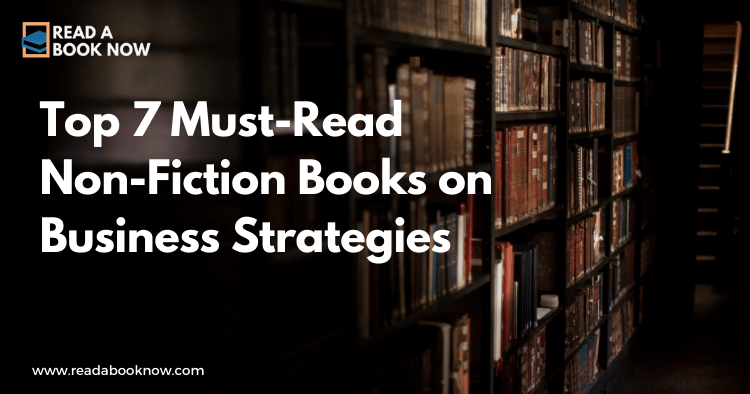Table of Contents
- Introduction
- 1. “Good to Great” by Jim Collins
- 2. “The Lean Startup” by Eric Ries
- 3. “Blue Ocean Strategy” by W. Chan Kim and Renée Mauborgne
- 4. “Thinking, Fast and Slow” by Daniel Kahneman
- 5. “The Innovator’s Dilemma” by Clayton M. Christensen
- 6. “Start with Why” by Simon Sinek
- 7. “Made to Stick” by Chip Heath and Dan Heath
- Conclusion
- FAQs
Introduction
In today’s fast-paced business environment, having a solid understanding of effective strategies can set you apart from the competition. Whether you are a budding entrepreneur, a seasoned executive, or someone passionate about business dynamics, reading is one of the best ways to expand your knowledge and sharpen your skills. In this article, we’ll dive into seven must-read non-fiction books that provide valuable insights into business strategies. Each of these works is not only informative but also engaging, ensuring you won’t just learn but also enjoy the process!
1. “Good to Great” by Jim Collins
Jim Collins’ “Good to Great” explores why some companies transition from being good to great while others fail to make the leap. Collins and his research team analyzed several companies, identifying key traits that enabled the transition.
Key Takeaways:
- Level 5 Leadership: Great companies have leaders who are humble yet driven.
- The Hedgehog Concept: Focus on what you can be the best at, what drives your passion, and what is economically viable.
- Culture of Discipline: Successful companies thrive on disciplined people taking disciplined action.
“In the end, it’s not the years in your life that count. It’s the life in your years.” – Abraham Lincoln
This book is a must-read for anyone interested in understanding the factors that differentiate successful companies from their less successful counterparts. Learn more about Collins’ findings here.
2. “The Lean Startup” by Eric Ries
Eric Ries’ “The Lean Startup” introduces a new approach to business that emphasizes rapid prototyping and validated learning. This methodology is especially impactful for startups looking to navigate uncertainty.
Key Takeaways:
- Build-Measure-Learn Loop: The cyclical process of turning ideas into products, measuring their success, and learning from the outcomes.
- Minimum Viable Product (MVP): Create a basic version of your product to test and gather user feedback quickly.
- Pivot or Persevere: Make informed decisions about whether to pivot your strategy or continue on the current path.
“The only way to win is to learn faster than anyone else.” – Eric Ries
Ries’ insights empower entrepreneurs to minimize waste and maximize their chances of success. Explore more on the Lean Startup methodology.
3. “Blue Ocean Strategy” by W. Chan Kim and Renée Mauborgne
“Blue Ocean Strategy” encourages businesses to seek untapped market spaces, or “blue oceans,” instead of competing in overcrowded markets.
Key Takeaways:
- Value Innovation: Create new value for customers while simultaneously reducing costs.
- Reconstruct Market Boundaries: Look beyond existing industry boundaries to discover new opportunities.
- Focus on the Big Picture: Shift from a narrow focus on the competition to a broader perspective on the market landscape.
“What you need to create a blue ocean is a mindset shift.”
This book is essential for anyone looking to break free from competition and innovate. Read more about Blue Ocean Strategy.
4. “Thinking, Fast and Slow” by Daniel Kahneman
Nobel laureate Daniel Kahneman’s “Thinking, Fast and Slow” dives into the dual systems of thought that drive our decisions: the fast, intuitive, and emotional system and the slower, more deliberate, and logical system.
Key Takeaways:
- Cognitive Biases: Understand how biases can cloud judgment and decision-making in business.
- Loss Aversion: Recognize that losses weigh heavier than gains, impacting risk-taking behavior.
- Anchoring: Be aware of how initial information can influence decisions and evaluations.
“Nothing in life is as important as you think it is while you are thinking about it.” – Daniel Kahneman
Kahneman’s work is enlightening for leaders who want to make more informed decisions. Find more about his research here.
5. “The Innovator’s Dilemma” by Clayton M. Christensen
In “The Innovator’s Dilemma,” Christensen discusses why successful companies can fail despite doing everything right. This book is a cornerstone of innovation literature.
Key Takeaways:
- Disruptive Innovation: Understand how smaller companies with fewer resources can successfully challenge established businesses.
- Value Networks: Recognize the importance of a company’s established customer base and the risks of ignoring emerging trends.
- Resource Allocation: Learn how companies often fail to invest in new technologies because they focus on their current successes.
“The greatest danger in times of turbulence is not the turbulence; it is to act with yesterday’s logic.” – Peter Drucker
This book is a critical read for anyone involved in innovation. Explore more about the Innovator’s Dilemma.
6. “Start with Why” by Simon Sinek
Simon Sinek’s “Start with Why” emphasizes the importance of understanding your organization’s purpose. By identifying why you do what you do, you can inspire others and build lasting loyalty.
Key Takeaways:
- The Golden Circle: Understand the importance of starting with ‘why’ (purpose), then ‘how’ (process), and finally ‘what’ (product).
- Inspire Action: Companies that start with a clear purpose are more likely to inspire and attract loyal customers.
- Align Values: Ensure that your team’s values align with your organization’s purpose for cohesive growth.
“People don’t buy what you do; they buy why you do it.” – Simon Sinek
Sinek’s insights are particularly powerful for leaders and marketers. Learn more about his work here.
7. “Made to Stick” by Chip Heath and Dan Heath
“Made to Stick” explores why some ideas thrive while others fade away. Chip and Dan Heath identify key principles that make ideas memorable and impactful.
Key Takeaways:
- Simplicity: Strip ideas down to their core for clarity.
- Unexpectedness: Surprise your audience to capture attention.
- Concreteness: Use tangible examples to illustrate ideas.
“The most basic way to get someone’s attention is to interrupt them.” – Chip Heath
This book is essential for marketers, educators, and leaders who want their messages to resonate. Dive deeper into their principles here.
Conclusion
The world of business is ever-evolving, and staying informed is crucial for success. The books discussed above offer diverse perspectives and strategies that can empower you to think critically and innovate effectively. Whether you are looking to enhance your leadership skills, improve your decision-making, or drive innovation, these titles will provide the insights you need. Happy reading!
FAQs
1. Why should I read business strategy books?
Reading business strategy books can provide you with valuable insights, proven frameworks, and innovative ideas that can enhance your understanding and approach to business challenges.
2. How can I apply the lessons learned from these books?
Take notes while reading, implement practical strategies in your own work, and engage with others to discuss insights. You can also create a plan to gradually test these strategies in real-world scenarios.
3. Are these books suitable for beginners?
Absolutely! While some concepts may be advanced, each book is written in a way that is accessible to readers at various levels of experience in business.
4. Where can I find these books?
You can find these books at major retailers like Amazon or your local bookstore, and many are also available as eBooks or audiobooks.
5. Can I recommend additional books?
Certainly! If you have favorite business strategy books not mentioned here, feel free to share your recommendations in the comments below.
Also Look For
For those interested in expanding their literary knowledge, you might want to explore classic literature that has shaped human thought and societal structures. Consider checking out:
- Top 7 Ancient Classics Everyone Should



